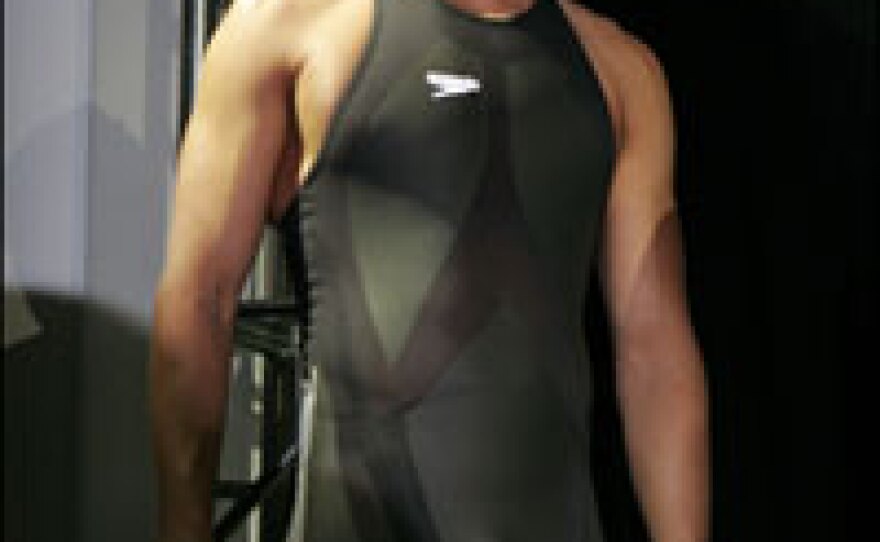

Some of the world's elite competitive swimmers believe a new high-tech swimsuit is just what they need to set world records and win Olympic medals.
In fact, 35 of the 37 swimmers who have broken world records in recent weeks were wearing the LZR Racer from Speedo. That has some swimmers scrambling for the suit and others referring to it as "technological doping."
The $550 swimsuit is sleeker than skin, with seamless stitching and water repellant padding where the body produces drag.
"It's a lot more compressed," says American swimmer Ryan Lochte, who set four world records last week alone during the short-distance World Swimming Championships in Manchester, England. "You can feel, like, your core being sucked in."
It's a super feeling, Lochte adds. "When I put it on, I feel like some sort of action hero, like I'm ready to take on the world."
He says the suit makes him feel like he's swimming "downhill."
Swimsuit Innovation
Lochte is sponsored by Speedo, which likes to quote such athletic enthusiasm. But he's not alone in wondering whether the swimsuit gives swimmers superhuman ability. One U.S. Olympic coach has already suggested that all Team USA swimmers should wear the Speedo LZR, even if they're sponsored by other companies making other swimsuits.
That would be a conflict for American breaststroker Brendan Hansen, who is sponsored by Nike. He doesn't want to be forced to wear the competitor's swimsuit.
If it came to that, Hansen says, he would "go up to Nike and say, 'You need to get your stuff together. You need to figure out what's going on.' And if they don't respond, then we're in a different situation" — one in which wearing the Speedo suit at the Olympics would be a "definite option."
Nike and other swimsuit manufacturers already have their new high-tech suits in development. Spokesman Dean Stoyer is bullish on Nike's answer to Speedo. "We're confident that it will perform just as well and our swimmers will perform just as well," Stoyer says.
He also notes that swimsuit innovation always precedes the Olympics, as does a torrent of falling world records.
Four-time Olympic gold medalist John Naber agrees. "Records will fall every fourth year at an accelerated pace," Naber says, "because the Olympics are coming, and now [swimmers] are bringing their 'A' game. The suit is coincidental."
Naber does acknowledge some physiological advantage to the new swimsuit. But he insists that is far outweighed by the psychological advantage of wearing a suit world record-holders wear.
"If you're standing on the starting blocks and you feel fast and you have no regrets, no worries and no doubts, that psychological state is hugely valuable. That is more of a difference than whatever technological advantage would be provided," he says.
An Unfair Advantage?
Naber was once sponsored by Speedo, but he's no fan of the new suit. He's worried that its $550 price tag will put the parents of younger competitive swimmers in a bind.
Some European swimmers and coaches consider the Speedo suit an unfair advantage. They have asked the International Swimming Federation, known as FINA, to reconsider its recent approval of the new Speedo LZR and other innovative suits.
Naber thinks any advantage is diminished by Speedo's promise to make the suit available to any Olympian who wants it. "It's not unfair unless it's not available to somebody who would otherwise do well," Naber maintains.
But Naber also worries that the focus on the swimsuit comes at the expense of swimmers.
"I don't want to diminish the credit a Michael Phelps deserves if he wins eight or nine gold medals [at the Beijing Olympics]. I don't want to have people say, 'Oh, it's just the suit.' That cheapens his effort and I don't think he deserves that," Naber says.
Hansen, the Nike swimmer, says that his swimsuit is the last thing he worries about as he goes into a race.
"I've never used it as a crutch. And I'm never going to look at it as what makes the athlete," he says.
That doesn't mean Hansen is oblivious to technology. He will debut Nike's entry in this swimming arms race at the U.S. Olympic trials in June.
Copyright 2022 NPR. To see more, visit https://www.npr.org. 9(MDAzMjM2NDYzMDEyMzc1Njk5NjAxNzY3OQ001))






